LGBT

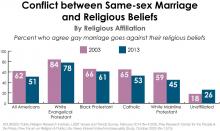
Americans’ attitudes toward the lives and choices of gays and lesbians have changed radically since Massachusetts first legalized same — sex marriage a decade ago.
A new survey finds a significant shift toward tolerance across every religious, political, and age group and every region of the country, said Robert P. Jones, CEO of the Public Religion Research Institute. PRRI’s survey, released Wednesday, reveals the ramifications of these changes in family, church, and community life.
“Only the issue of marijuana looks anything like this in terms of rapid movement in favorability,” Jones said. “But with that one exception, it’s unusual to see this much change in a relatively short amount of time.”

My flight home from Phoenix over the weekend got pushed back, so I wound up spending an extra night at an airport hotel. Also, I got an $8 food voucher from the airline. I decided to eat at the hotel.
The restaurant was located on the top floor of the hotel with a nice view of downtown. There was a small bar near the entrance. A handful of hotel visitors were enjoying complimentary drinks and watching the Olympics on a flat-screen television.
I was greeted at the door by Melody, a transplant from Erie, Pa., who doubles as a bartender and a server. When I mentioned that I had a food voucher, she offered condolences for my scrambled travel plans. She also offered me a free beer.
Glass of red ale in hand, I picked a table in a corner of the restaurant, ordered a spinach salad and went back to reading a book about the Rev. Martin Luther King, Jr. and the long struggle to get the country to live up to its ideal that everyone should be treated as an equal child of God.
I couldn’t help but think about my 10 days in Arizona watching the state legislature debate and ultimately pass a bill that would allow business owners and individuals to refuse service to anyone on grounds of religious freedom. The impetus was a New Mexico case involving a photographer who refused to take photos of a gay couple.
The bill was promoted as a religious liberty issue. Opponents pointed out that it was the definition of discrimination — people would be singled out for unequal treatment.
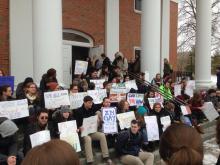
We may not all be rich. We don’t all have successful careers. We aren’t all healthy. But the one thing we all have are stories. From the beginning of time, we have thrived on connecting via stories. We consume stories for leisure, speak our stories for sanity, and create stories to capture our imagination.
We are swayed by stories. Stories can compel others in ways propositions and facts statements cannot. Our attention wanes at statistics and exegesis, but perks at vivid characters in an engaging plot. Stories have been proven to be an effective rhetorical device. They draw people’s attention in and leaves them satisfied upon conclusion.
You cannot debate a story. While it may be tempting to try and deconstruct the reasoning behind stories when it goes against your agenda, the genius of stories is that it can’t be used as an argument. The story of a chain smoker’s longevity sits uncomfortably in the presence of someone advocating the ills of nicotine. The story just is. We cannot alter it, the only thing we can control is how we choose to respond to it. Any attempts to dishonor or discredit someone’s story is an assault to their humanity.

“Be perfect, therefore, as your heavenly Father is perfect” (Matthew 5:48). Seriously, Jesus? Have you even met some of us? Have you seen the depths of our jealousies, the breadth of our greed? Have you noticed how insatiable our egos are? How deeply insecure we all are?
Perfect?
You cannot mean what you seem to mean.
What then do we do with this seemingly impossible call? For many of us, this is one of those passages in the Bible we seek to explain away. Jesus can’t possibly mean what he says here. We reckon that he must be calling us merely to aspire to perfection. Or we conclude that in calling us to perfection, we realize how very far we are from it and thus lean on God’s grace. But certainly, absolutely, without a doubt, Jesus cannot be calling us to be perfect like God is perfect.
Right?
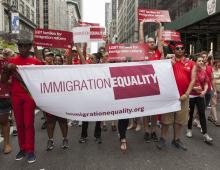
I’m a big fan of the TV show Mad Men, which takes place in the midst of the Madison Avenue advertising agencies back in the ’60s and ’70s. Sure, I enjoy the drama and the “cool factor” of Don Draper and his cavalier ad team. But for me, the most fascinating part is all of the cultural norms of the time that seem fairly shocking now, only a few decades later.
Of course, there’s all the drinking and smoking in the office, but beyond that, the way that non-Anglo employees and the women in the workplace are treated would today be grounds for a lawsuit, if not public shaming for such brazen chauvinism. The thing that’s hard to remember is that, although we see such behavior as morally offensive today, it was simply normal back then.
Methodist minister Rev. Frank Schaefer (not to be confused with Frank Schaeffer) has come up against what some might call a conflict of interest in living out his call as a minister of the gospel. Some might even call his experience a crisis of faith, but for Schaefer and his son, Tim, the struggles they have faced in recent weeks and months have yielded beautifully unexpected blessings.
Schaefer's troubles with the larger Methodist Church go back some six years to when he performed a wedding ceremony for Tim, who is gay. Although his son realized this would present Schaefer with a dilemma (the United Methodist Church does not allow their ministers to conduct same-sex marriages), he also knew that it would hurt his father deeply not to be asked to perform the ceremony, regardless of whom he was marrying.
The wedding was performed in Mass., where same-sex marriages are legally recognized.
Though it took some time, charges were brought against Schaffer within the denomination, and he has recently had his license for ministry suspended. He is now facing an ultimatum: either he has to renounce his support for the performance of same-sex marriages or he will be defrocked within a month.

American Jews say they face discrimination in the U.S., but they see Muslims, gays, and blacks facing far more.
This and other findings from the recently released Pew Research Center’s landmark study on Jewish Americans help make the case that Jews — once unwelcome in many a neighborhood, universitym, and golf club — now find themselves an accepted minority.
“While there are still issues, American Jews live in a country where they feel they are full citizens,” said Kenneth Jacobson, deputy national director of the Anti-Defamation League, which was founded in 1913 to combat anti-Semitism.

As a boy growing up, Joanna Maria Cifredo wasn’t like her brothers.
“My brothers looked at females because they wanted to be with a female,” Cifrado says, in new video resource by the Human Rights Campaign that premiered Oct. 1. “I looked at females more like, ‘Oh, I wish I was her.’ ”
Now, Joanna has decided to physically identify as a woman full time.
Her voice joined many others in Before God: We are All Family, a new film focused on the experiences of Latina LGBT people. She also participated, along with her mother Maria Vega-Cifredo, in a discussion panel that included the filmmaker at the first public viewing of the resource at the GALA Hispanic Theater in Washington, D.C.
Focusing on the important role family and faith play in Latino communities, the video resource is the newest component to a bilingual discussion guide produced by the HRC and the National Latina/o LGBT Human Rights Organization, among others. The organizations developed the guide with the aim of helping Latinos have a conversation about faith and LGBT inclusion.
The guide, written by Rev. Dr. Miguel A. de la Torre, with help from Rev. Dr. Ignacio Castuera and Lisbeth Melendéz Rivera, gathers 14 testimonies into six chapters, each with stories, questions, and exercises focused on what it means to be LGBT and Latina. Inside the guide, created in 2011, are sections on family, the gift of our bodies, the Bible, and solidarity.

I am an evangelical.
But what does that label even mean anymore?
A few days ago I was sitting around chatting with a few new friends at my Bible college. One of them was a young Canadian and another was a middle-aged former U.S. soldier. We ended up on the topic of politics and how many companies and businesses in the United States give millions to political and social causes and somehow we ended up talking about McDonalds.
My USAF friend made the statement: “McDonalds is terrible because it gives millions to causes and organizations that you [speaking of me] directly oppose: LGBTQ rights campaigns, Planned Parenthood, etc.” I was taken aback because my new friend simply assumed that because everyone in this conversation was an evangelical meant that we all held a certain set of political ideals and social standards. For him — for millions of others — evangelical meant something far more than a theological persuasion. In the midst of this awkward moment, I decided to reveal my identity as a politically progressive/liberal evangelical, which automatically caused an immense amount of tension to arise in our conversation. How could I, a Bible-believing evangelical, possibly support the LGBTQ community’s right to marry? How could I think that Planned Parenthood was doing any good and that President Obama’s plan to rapidly decrease the numbers of abortions in the United States was progress in any way? Let’s just say that the conversation ended on a pretty tense note.
This encounter really caused me to re-reflect on the magnitude that the term evangelical has been hijacked by political and social agendas over the past decade and how a new generation of evangelicals is emerging that does not at all identify with any of the social and political baggage that has come to represent evangelical Christianity. Which brings me back to my original question: What does the label evangelical even mean anymore?
I can tell you this — it doesn’t mean that I am a Republican. It doesn’t mean that I am a Democrat. It doesn’t mean that I am pro- or anti-anything.
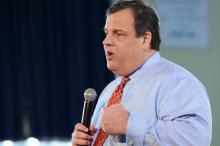
New Jersey’s newly enacted ban on gay-to-straight conversion therapy for minors violates a licensed therapist’s obligation to “respect the rights of clients to make decisions,” according to a federal lawsuit filed by a Christian counselors group and professionals who use the practice.
The law, signed by Gov. Chris Christie on Aug 19, bars any licensed therapist, psychologist, social worker, or counselor from using therapies to change sexual orientation of children under age 18. Offenders jeopardize their licensed status under the new law, which does not apply to clergy or anyone who is not licensed by the state.
New Jersey is the second state in the nation to ban therapy that purports to change a child’s sexual orientation from homosexual to heterosexual. California enacted the first ban, but Liberty Counsel, a national religious-based legal and public policy group, filed an injunction it before it took effect earlier this year. A judge overseeing the case heard arguments in April and has not issued a decision.
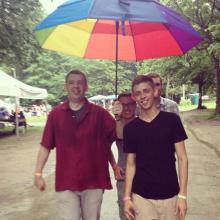
I woke up this morning in a damp sleeping bag to the sound of a rushing river. I heard the laughter of children and could smell bacon being fried in a tent not far from mine. I opened the tent flap and walked outside. As I looked around, I saw dozens of men and women who had also just rolled out of their sleeping bags and RVs to welcome the new day. I saw rainbow flags flying next to signs that read “Who would Jesus Torture?” and “Pro-Peace, Pro-Life, Be Consistent.”
As I began the short trek from my tent to the shower-house, I was greeted by dozens of people who I had never personally met but felt like I knew intimately. All of us had gathered to encourage and provoke one another to do justice, love mercy, and walk humbly with our God. Over the course of this weekend, dozens of presenters spoke to crowds who listened intently to their dynamic messages of reformation, renewal, redemption, and action. From the testimony of a tattooed Lutheran pastor to the ground-breaking theological theories on non-violence from a highly regarded gay Catholic priest, from the wisdom of one of the founding fathers of the Civil Rights Movement to a quirky live radio show hosted by one of the founders of the Emergent Church movement, hundreds of people from across the country and indeed around the world had converged for this little slice of heaven on earth known as the Wild Goose Festival.

Amy Ray’s smile opened itself to wrap love around the couple thousand fans who’d weathered a soggy soaker of a spiritual festival to wait for their 10 p.m. Saturday set. “Y’all have advanced way past kum-bah-yah,” she quipped. “That was a deep album cut.”
For 90 minutes, Ray and her musical partner Emily Saliers couldn’t stop praising the Wild Goose Festival crowd. It’s as if they’d trekked to the misty mountains of western North Carolina just to see us render their greatest hits the new hymnal for progressive and inclusive Christianity. The stellar setlist covered all the ground, a collection of tracks both new and old spanning a career that jump-started itself in the same 1980s Georgia music scene that gave us the likes R.E.M. and Widespread Panic.
The Indigo Girls catalog knits itself into our daily lives in such a way to make them the perfect band for a campfire singalong at a radicals’ revival like this. But what else was obvious here could not be pinpointed in the mere practice of song. The best-selling grassroots folk duo found something in our makeshift festival that’s been true of their career — past all the great lyrics and legacy of activism, past the DIY-ethics and indie entrepreneurs' edge, past all the albums and compilations, past all the accolades — exists the chewy center of hope. We see the Holy Spirit at work in such a down-to-earth humbling and fiery fashion. The Indigo Girls headline set at Wild Goose 2013 healed the audience and sealed the festival’s cultural location in a jubilant justice movement for ecumenical and evangelical convergence on the funky fringes of mainstream Christianity.
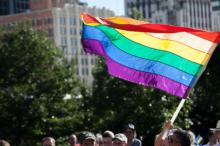
A new voice is emerging in the evangelical community, and it’s turning away from the church’s vocal opposition to homosexuality in favor of a more tolerant attitude.
Researchers at Baylor University found that 24 percent of evangelicals were “ambivalent,” meaning they support civil unions or legal recognition of gay relationships, despite harboring a moral opposition to homosexuality.
“What you have is this increase in people coming out publicly and saying, ‘I don’t want to be a part of this anti-gay rights movement as an evangelical,’” said Lydia Bean, assistant professor of sociology at Baylor and co-author of the study.
The study, “How the Messy Middle Finds a Voice: Evangelicals and Structured Ambivalence towards Gays and Lesbians,” analyzed national data from the 2010 Baylor Religion Survey, conducted by Gallup.

THIS SUMMER, two Supreme Court outcomes dramatically affected the reality of the words “Equal Justice Under Law.” In the first, a key component of the historic Voting Rights Act of 1965 was struck down, jeopardizing equal justice under the law especially for black, Latino, and low-income people whose voting rights have historically been assaulted and have continued to be suppressed as recently as the 2012 election. Efforts to increase barriers to voting for people of color, especially those with lower incomes, are already underway in several states. The Supreme Court’s decision was morally shameful.
The decision revealed how politically partisan this bench has become. The conservative justices have aligned themselves with the extreme right-wing politics that has taken over today’s Republican Party—one that has deliberately encouraged and practiced voter suppression against minorities, low-income people, the young, and the elderly.
America has made great progress on racial justice because of the tireless and courageous efforts of many. But the illusory idea of a “post-racial” America is exposed as a lie by this nation’s criminal justice system, the many recent attempts at racially based voter suppression, and now this decision by the Supreme Court.

Pope Francis quickly is establishing himself as the “peoples’ Pope.” He has actively advocated for the poor, downplayed his elevated status, and speaks in colloquial terms that make him seem that much more human. He has left open the possibility that non-Catholics, non-Christians, and even atheists may fall within the vast embrace of a radically loving and merciful God. And now, he’s even made what many consider at least a benign – if not affirming – statement about homosexuality.
Historically, popes have toed an ideological line, asserting that homosexuality is inherently evil, and that all gay people are fundamentally disordered. In an expression of sincere humility, political savvy, or perhaps some combination of both, Francis took a more compassionate position, adding at the end of his comments, "who am I to judge?"
Welcome to the 20th century, Catholic Church.
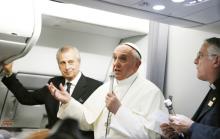
With his open and easygoing manner, Pope Francis charmed the media as much as the faithful during his successful visit to Brazil, the first international pilgrimage of his pontificate.
But it was the pope’s remarks about gay priests, made during a free-wheeling press conference on the return trip to Rome, that drew the most headlines, raising questions about whether the pontiff was signaling a change in the church’s approach to this volatile issue.
When asked by reporters about rumors of a “gay lobby” of clergy in the Vatican who were exposing the Holy See to blackmail schemes and scandal, Francis at first joked that while there’s a lot of talk about such a lobby, “I have yet to find on a Vatican identity card the word ‘gay.’”
Then, in a more serious vein, he added:
“I think that when we encounter a gay person, we must make the distinction between the fact of a person being gay and the fact of a lobby, because lobbies are not good. … If a person is gay and seeks the Lord and has good will, who am I to judge that person?”

More Light Presbyterians, a network of congregations and individuals in the Presbyterian Church (USA) that advocates for LGBT inclusion, today announced Alex McNeill as their new executive director. McNeill is the first openly transgender person to lead a mainline Protestant organization.
McNeill, a longtime advocate for gay, lesbian, bisexual, transgendered, and queer Christians, has longstanding roots in the church.
“[The church] embodies the belief that faith calls us to action. We have a commitment to live out our call to care for the poor, for the hungry, and for the outcast. So we seek to not just teach values, but to equip people with tools for social justice,” he continued.
Religious leaders from across the country revealed their thoughts on yesterday’s DOMA and Prop. 8 decisions. Stating both good and bad opinions, religious leaders touched on various viewpoints and shared examples of how yesterday’s decisions will affect the future of religion across the United States. USA Today reports:
Religious leaders on opposing ends of the gay-marriage debate alternately referred to Wednesday as a tragic and a celebratory day after the Supreme Court's decisions on two same-sex marriage cases.
But the traditional religious opponents of gay marriage remained steadfastly against the rulings, condemning them as far reaching and inconsistent with religious principles.
Read more here.
“DOMA is dead.”
Such were the chants heard outside the United States Supreme Court yesterday when it was announced that the highest judicial body in the nation voted 5-4 to strike down the Defense of Marriage Act (DOMA). That’s right. As of yesterday, there is no longer a federal law defining marriage as a union between a man and woman.
Of course, not every American is roundly rejoicing. Responses from the Christian community, which has become more divided over the issue in recent years, are mixed. Conservative Christians seem mostly despondent while the progressives among them are mostly celebrating. I spoke with several prominent Christians from across the political spectrum today to get their reactions to the Court’s decision: